Is Zuckerberg Just a Roman Empire Nerd, or Augustus’ Descendant?
Mark Zuckerberg’s fascination with the Roman Empire, from wearing Latin slogans like “Aut Zuck Aut Nihil” to references to Augustus, is more than just symbolic. Could his obsession hint at a deeper connection to the ancient ruler himself?
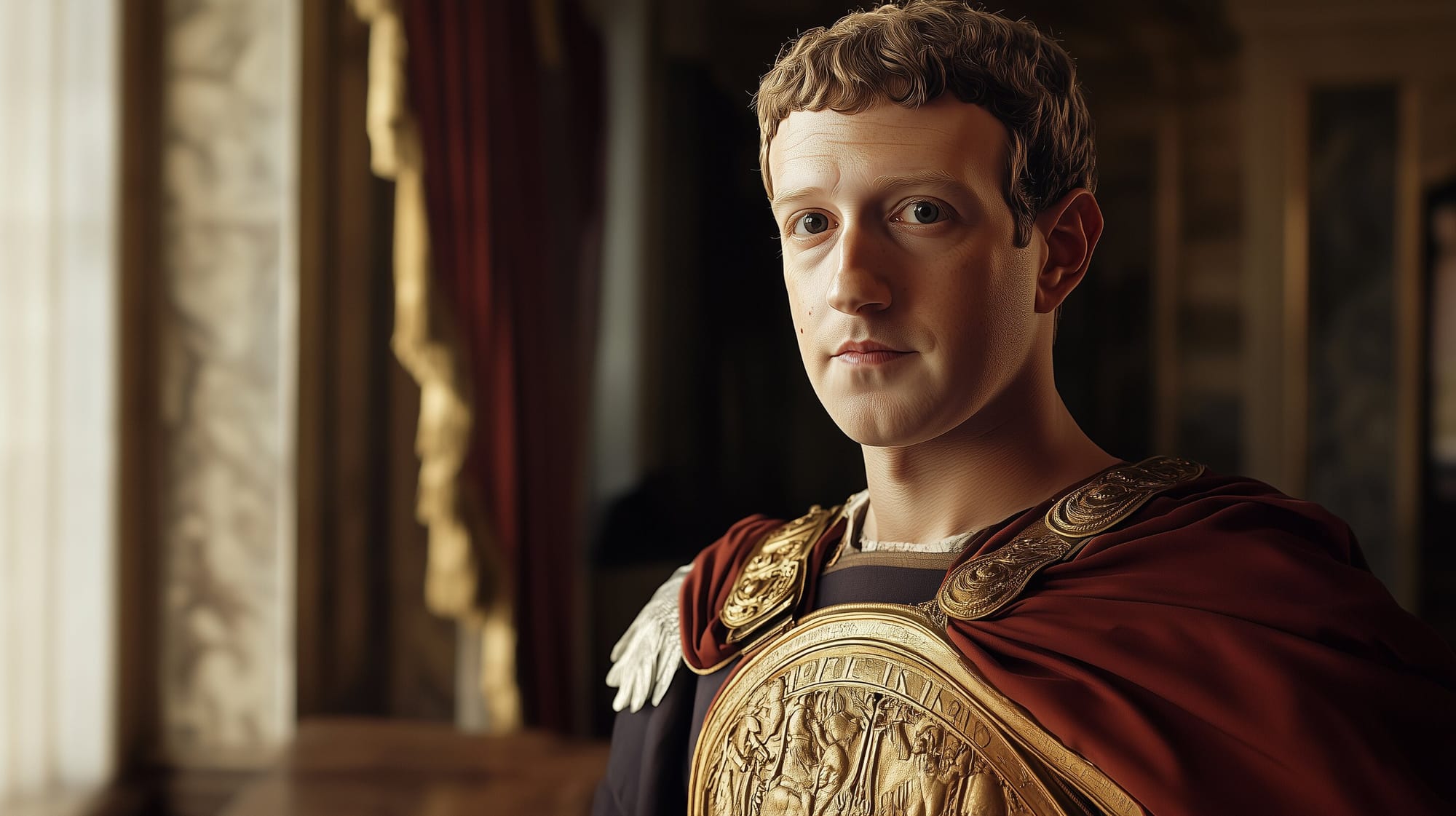
In September 2024, Mark Zuckerberg once again drew attention with his fascination for the Roman Empire when he appeared in an oversized t-shirt at Meta's latest event, emblazoned with the Latin phrase, "Aut Zuck Aut Nihil." The slogan, a clever twist on the historical phrase "Aut Caesar Aut Nihil" (either Caesar or nothing), sparked curiosity and conversation across social media platforms.
The phrase boldly implies a desire for dominance or nothing at all—an idea associated with the Roman Emperor Augustus. As the world watched Zuckerberg, some began to wonder whether his obsession with the Roman world goes beyond admiration: could he be hinting at something more, perhaps even an imagined lineage?
The Meaning Behind "Aut Caesar Aut Nihil"
"Aut Caesar Aut Nihil" is a Latin phrase that translates to "Either Caesar or Nothing," and it was historically associated with Roman emperors, especially Augustus. The phrase symbolized absolute power and dominance, a sentiment reflecting Rome's culture of supremacy under Caesar’s reign.
The message is simple: to either achieve greatness or be reduced to irrelevance. Augustus, also known as Octavian, embodied this mentality as the first Roman Emperor, consolidating power and transforming the Roman Republic into the Roman Empire. His quest for complete control of the Roman world was emblematic of this slogan.
Zuckerberg's alteration to "Aut Zuck Aut Nihil" suggests parallels between his ambition in the tech world and the power Augustus wielded in ancient Rome. Much like Augustus, who reshaped Rome after years of civil war, Zuckerberg has been reshaping the digital landscape, most notably with Meta’s advancements in AI and social media dominance.

His choice of words is not just a marketing tool—it speaks to his personal identity as a modern ruler of the digital realm.
Zuckerberg adorning his ‘Carthage’ T-shirt, alongside Bill Gates, during his birthday. Credits: Mark Zuckerberg
Sources like Sophie Swerts Knudsen shed light on the historical context of the original phrase, showing how it was used by those who desired absolute rule, with little room for compromise. Zuckerberg's use of this phrasing aligns with his relentless ambition to lead Meta to dominance in the tech industry.
The phrase became a popular Latin motto symbolizing absolute ambition, often used by those seeking ultimate power. It conveys the idea of striving for greatness, with no middle ground between success and failure. It also reflects the ruthless pursuit of supremacy, much like how Julius Caesar sought to dominate Rome or be nothing.
This ambition resonated in various historical contexts and has been adopted by influential figures over time, including the notorious Borgia family. The Borgias, particularly Cesare Borgia, embodied the "Aut Caesar aut nihil" mentality in Renaissance Italy. Cesare, the illegitimate son of Pope Alexander VI, used his father's influence to carve out his own empire through military conquests and political maneuvering.
His ruthless ambition aligned with the motto as he sought to dominate Italy’s fragmented city-states. Cesare's rise and fall mirror the volatile nature of power, and the phrase perfectly captures his relentless drive to become Italy's ultimate ruler, much like Caesar in Rome.
The Latest Instagram Post and "Aut Demos Aut Nihil"
Following this Roman-themed event, Zuckerberg doubled down on the symbolism by posting an Instagram reel with the caption "Aut Demos Aut Nihil." This time, the reference to live demos further played into the idea of control. In the tech world, demos are a way to prove dominance through innovation. For Zuckerberg, they serve as a metaphor for displaying Meta’s technological power, whether through AI, social media, or virtual reality.
The post not only hinted at the company's future direction but also subtly reinforced Zuckerberg’s vision of Meta as the empire of the digital age, where demos and innovations are the key to survival. In a modern context, this could be seen as Zuckerberg positioning Meta’s AI innovations—like the new Llama 3.1 model—as tools to cement his place as the digital Caesar, a leader who must continuously demonstrate superiority or risk losing it all.
Zuckerberg's 40th Birthday and the Carthage T-Shirt: Symbolism of Power Struggles
Zuckerberg’s fascination with ancient history surfaced again when he donned a t-shirt referencing Carthage for his 40th birthday celebration. This likely refers to the rivalry between Carthage and Rome, culminating in Rome’s destruction of Carthage in 146 BC during the Punic Wars.
For Zuckerberg, this could symbolize his company’s ongoing battle with competitors like Apple in the virtual reality space. Apple’s new VR headsets stand in competition with Meta’s Oculus line, and the choice of the Carthage t-shirt suggests Zuckerberg sees this rivalry in the same light as the Roman-Carthaginian conflicts—an existential struggle where only one can emerge victorious.
In essence, by wearing a Carthage t-shirt, Zuckerberg may have been signaling that he views his competitors as rivals in the same way Rome saw Carthage: enemies to be destroyed for the sake of complete dominance. In an industry as cutthroat as tech, this comparison is telling of how Zuckerberg sees himself—much like a Roman emperor defending and expanding his empire.

A Notorious History of Egotism: From "I'm CEO, Bitch" to Roman Caesars
Zuckerberg's love for bold statements goes back to his early days at Facebook, when he famously had business cards printed with the slogan, "I’m CEO, Bitch." This notorious phrase reflects the youthful brashness that has marked his career, a refusal to bend to norms and an unrelenting desire for control.
Much like Augustus, who faced his own political rivals and maintained a tight grip on power, Zuckerberg has displayed a consistent determination to remain at the top of his industry. His use of phrases like "Aut Zuck Aut Nihil" seems to align with this mindset, revealing an attitude of dominance or nothing.
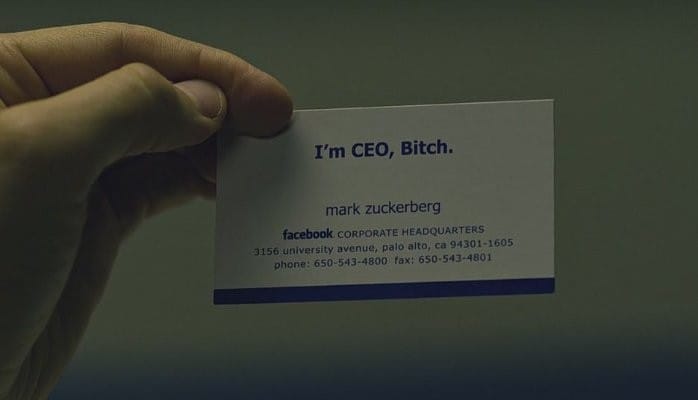
Could Zuckerberg be Augustus’ Descendant?
While Zuckerberg’s Roman-inspired imagery and slogans are likely symbolic, some wonder if there could be a more direct connection. After all, Zuckerberg’s great-grandparents hailed from regions with deep historical roots in the Roman Empire, including Prussia, Austria, and Galicia. According to genealogical sources like Geneanet, it is possible that Zuckerberg’s lineage could trace back to areas once under Roman control.
Genetic research has suggested that many Europeans could be descendants of Roman emperors like Charlemagne, and by extension, possibly Augustus himself. In fact, studies like the one conducted by Nature indicate that the vast majority of people of European descent are likely related to historical figures such as Charlemagne due to the sheer interconnectedness of genealogical lines over centuries. If this holds true, Zuckerberg could theoretically be descended from Roman nobility or even Augustus, much like how many Europeans today unknowingly share genetic links with famous historical figures.
As Adam Rutherford of The Guardian notes, the nature of human ancestry is so intertwined that most Europeans share genetic ties to historical figures from antiquity, including Roman emperors. This raises the tantalizing possibility that Zuckerberg’s fixation on Augustus may stem from more than mere admiration—it could reflect a subconscious connection to his ancient ancestry.
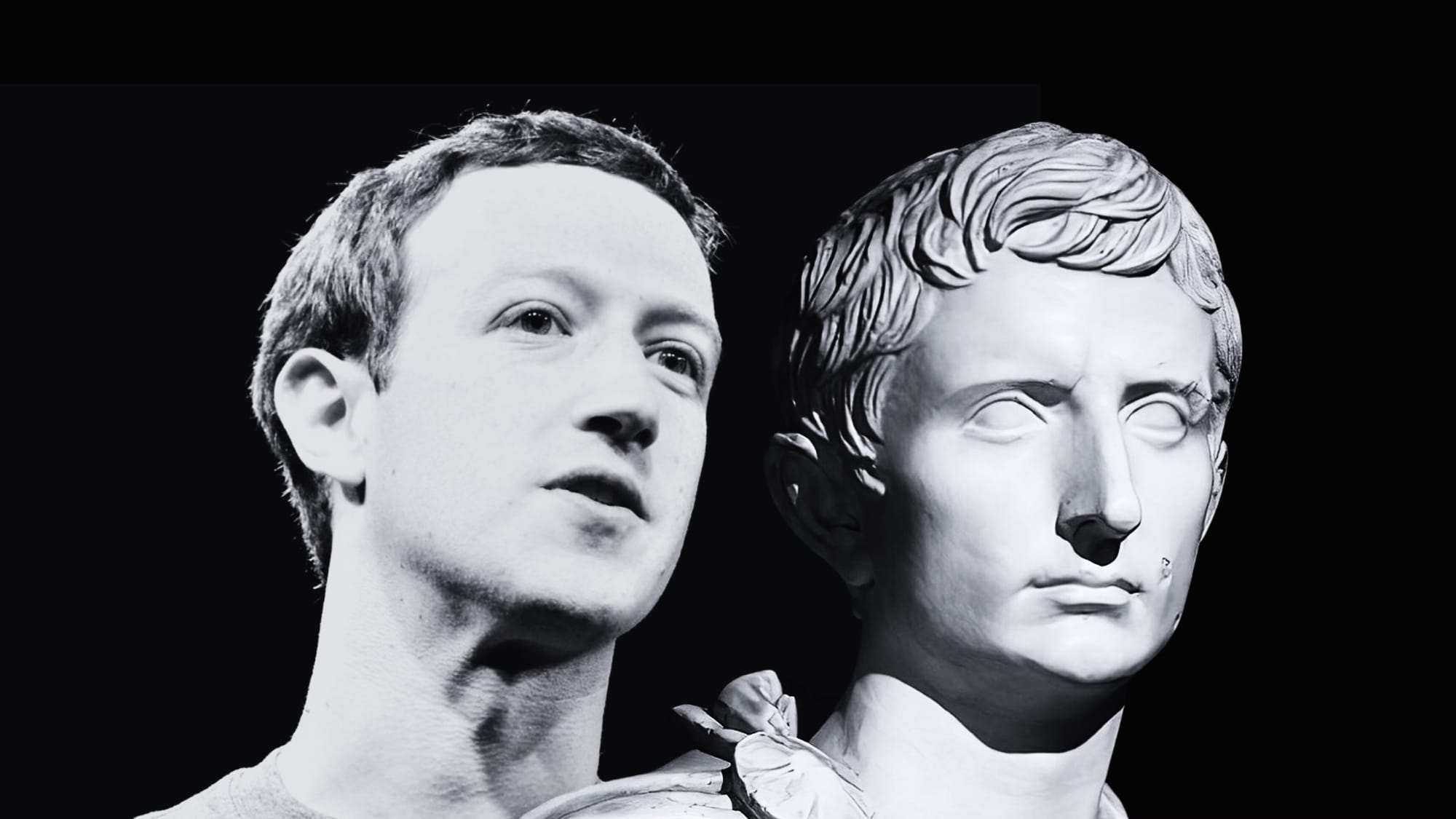
The Evidence Mounts: Is Zuckerberg Channeling Augustus?
Building on our previous analyses on Mark Zuckerberg, it becomes clear that his obsession with Roman imagery goes beyond casual interest. His consistent reference to Augustus, rather than other Roman emperors like Marcus Aurelius or Nero, suggests that he specifically identifies with the figure of Augustus—the emperor who transitioned Rome from a republic to an empire, much like how Zuckerberg has overseen Facebook’s evolution into Meta, a tech empire.
Additionally, Zuckerberg’s resemblance to Augustus, as some have pointed out, only fuels speculation that he might feel an intrinsic connection to Rome’s first emperor. The choice to continuously reference Augustus could reflect more than just admiration—it might be an acknowledgment of shared ambition, vision, and perhaps even lineage.
Whether or not Zuckerberg is truly descended from Augustus, his actions suggest that he sees himself as a modern Caesar, reshaping the world through technological innovation. From his bold use of Latin slogans to his strategic comparisons to historical figures, Zuckerberg is crafting an image of himself as the ruler of the digital empire. Just as Augustus sought to solidify his place in history, Zuckerberg is doing the same—but in the virtual world.
As technology continues to shape the future, we may see Zuckerberg embracing even more Roman-inspired imagery, positioning himself not only as a tech leader but as a modern-day emperor. Whether this is just symbolic or stems from deeper genealogical roots, one thing is certain: Zuckerberg's fascination with Augustus is no passing phase—it’s a reflection of his vision for power, control, and legacy in the digital age.
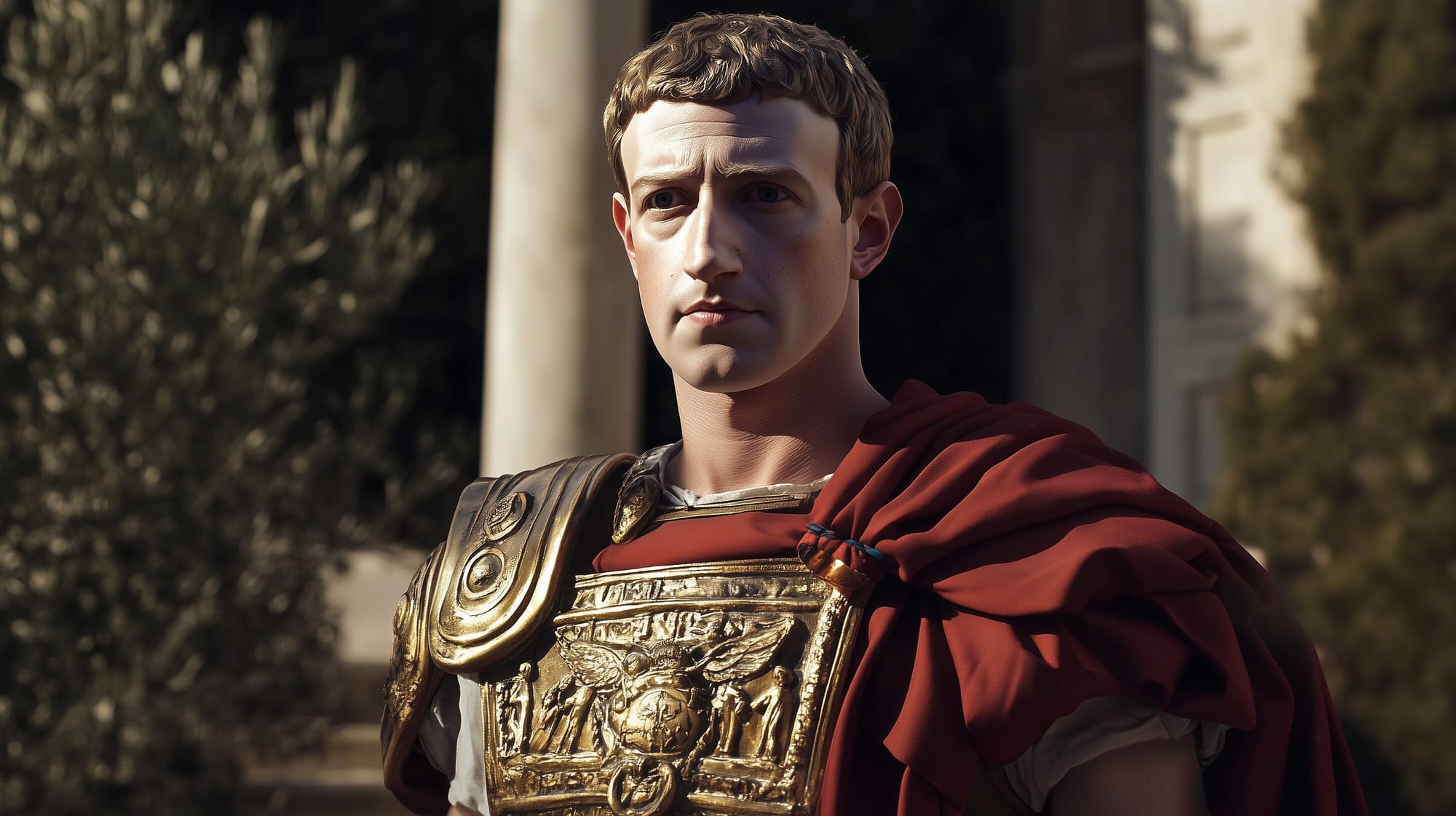



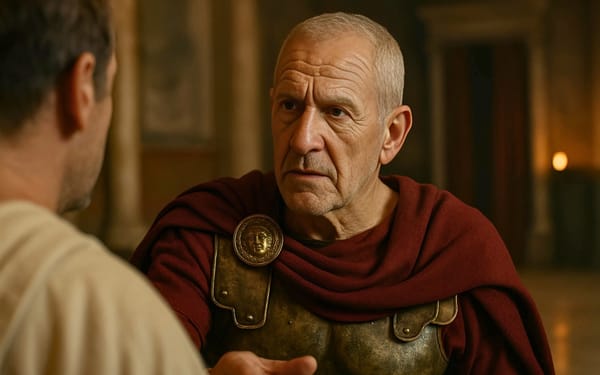


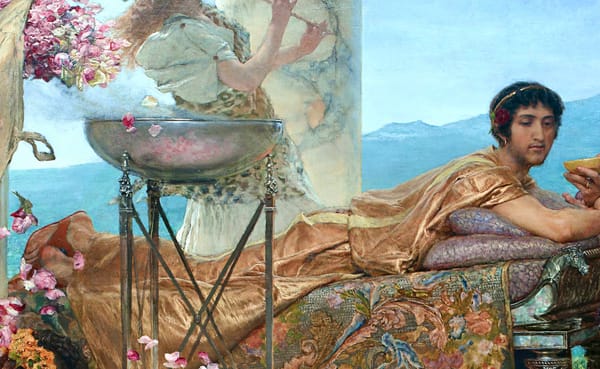


About the Roman Empire Times
See all the latest news for the Roman Empire, ancient Roman historical facts, anecdotes from Roman Times and stories from the Empire at romanempiretimes.com. Contact our newsroom to report an update or send your story, photos and videos. Follow RET on Google News, Flipboard and subscribe here to our daily email.
Follow the Roman Empire Times on social media: